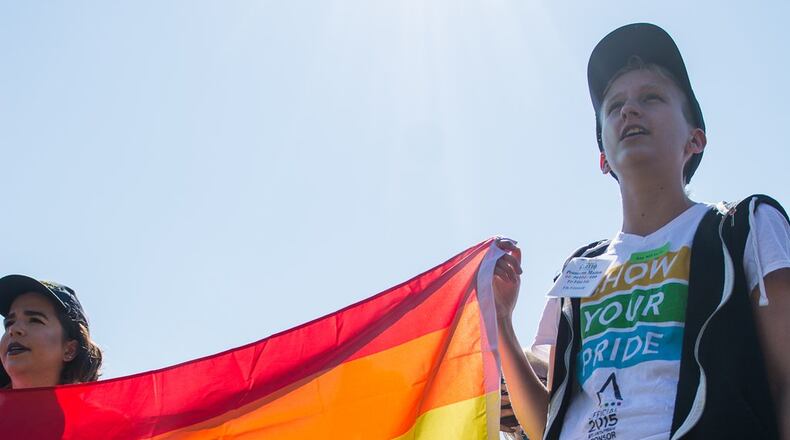Georgia United Against Discrimination, a grass-roots campaign focused on protecting rights for gays and transgender people in the state, released a report Wednesday calling for a statewide, comprehensive civil rights law to protect people in employment, housing and public accommodation.
The call follows last year’s House Bill 757, a “religious liberty” bill that would have allowed faith-based organizations to refuse services to those whose practices conflicted with their religious beliefs.
“Updating the state’s anti-discrimination laws should not and does not conflict with religious freedom,” said Jeff Graham, the executive director of Georgia Equality, an advocacy group for the lesbian, gay, bisexual and transgender community, said Wednesday during a Capitol press conference.
Gov. Nathan Deal vetoed HB 757 in April after receiving pleas from several high-profile companies and seeing the economic influence of similar measures in other states.
State leaders have already said they don't plan to make it a focus during the session, but state Sen. Josh McKoon said he's working with Republicans to present another version of a religious liberty bill and doesn't see the necessity of a state civil rights law.
“I strongly support the existing federal civil rights act and believe that it is working,” said McKoon, a Republican from Columbus. “I don’t think we need a redundant piece of legislation at the state level.”
Federal civil rights laws protect people from discrimination based on race, religion, gender and national origin, and they cover citizens in all states. The “state-based remedy” that advocates are proposing would add sexual orientation and gender identity to the list of protections and decrease the burden of filing suits in federal court, which can cost more money.
Graham doesn’t see the need for a religious liberty bill because a civil rights law would also protect religious freedoms.
“It should be able to be addressed in one bill,” Graham said. “We don’t need separate bills for separate types of discrimination.”
Graham was joined by various religious leaders from across the state, as well as Gerald Durley, former pastor of Providence Missionary Baptist Church.
During an annual celebration of Dr. Martin Luther King Jr.’s legacy, Durley encouraged politicians to “give real meaning to Dr. King’s words” by supporting a state civil rights law that would also protect racial minorities against discrimination in voting, housing and transportation.
Representatives of the organization have had conversations with lawmakers and expect legislation based on recommendations from the report to be introduced in the coming weeks.
About the Author
Keep Reading
The Latest
Featured





